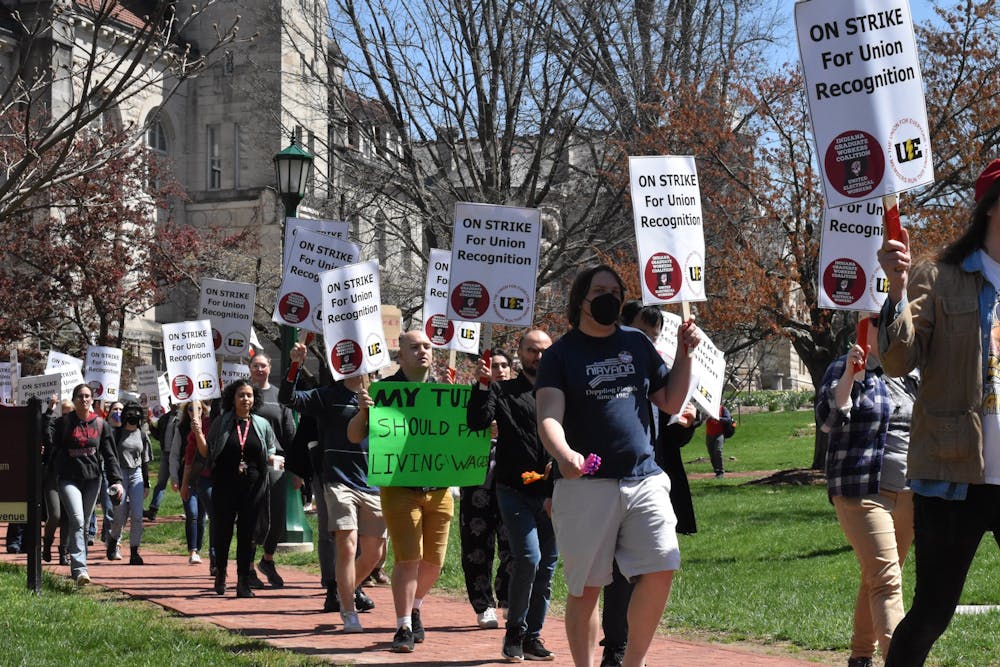IU graduate workers are petitioning IU administration for a salary raise to account for the standard of living in Bloomington and will face a reduction in the number of future doctoral student admissions moving forward.
Graduate workers petition for raise
The Indiana Graduate Workers Coalition United Electrical Workers submitted a petition for an 8% salary increase to IU administration March 31. IGWC-UE requested this increase based on the estimated cost to maintain a given standard of living in Bloomington. The request comes as inflation nationwide is nearly double its long-term average of 3.28%, according to the Bureau of Labor Statistics.
According to the Department of Housing and Urban Development, the average rent for two-bedroom units in Bloomington increased by 15.76% from 2022 to 2023.
[Related: Indiana Graduate Workers Coalition calls for 8% cost of living adjustment]
At a Bloomington Faculty Council meeting on April 18, IU Provost Rahul Shrivastav said he did not support the proposed raise due to its potential cost to administration.
Shrivastav said at the meeting the 8% pay increase requested by the IGWC-UE for all faculty, staff and graduate workers would cost the university $200 million and would require tuition to rise 12%.
Shrivastav and the Office of the Provost and Executive Vice President did not respond to requests for comment by the time of publication.
Fewer doctoral student admissions moving forward
According to Rob Potter, director of graduate studies in The Media School, there will also be fewer doctoral student admissions in the future to account for the 46% raise graduate students received last year after going on a four-week strike.
Potter said the university is decreasing doctoral student admission because the available budget for graduate students has not increased to account for last year’s promised raise.
“So essentially their compensation went up, but the general pool of money devoted to funding graduate student compensation remained the same,” Potter said. “The pie didn’t get bigger, but the slices did, and that means we can admit fewer doctoral students than we have in the past.”
Moving forward, graduate students admitted into Ph.D. programs at IU will receive four years of funding for their studies, Potter said. Graduate students currently enrolled in these programs will receive the promised funding necessary to complete their dissertations.
[Related: David Daleke appointed dean of IU Bloomington graduate school]
Potter said IU has traditionally provided funding to cover doctoral students’ participation in these programs for four years. However, he said there is no obligation to extend that funding into fifth and sixth years of doctoral studies.
“Our Ph.D. program applicants must have completed four years of undergraduate studies and gotten their master’s degree,” Potter said. “The idea is that the doctoral students come in with the 30 credits of their master’s degree able to complete their dissertations in four years.”
Denizhan Pak, a doctoral student in cognitive science and informatics, associate instructor of informatics and correspondence coordinator for Indiana Graduate Workers Coalition at IU, alleges funding that could be used for graduate student stipends is being used for the IU 2030 plan. The IU 2030 plan charts out a seven year plan to improve IU’s impact on the community including more opportunities for enrolled and potential students, more resources put toward research and creative opportunities and expanded university engagement outside the state.
[Related: IU releases 7-year strategic plan to expand the university's impact]
Pak said in an email that the 2030 plan is expected to receive funding from investments in departments such as the College of Arts and Sciences, while graduate worker stipends are not receiving additional funds to account for inflation.
Pak said a petition from last year included clauses not just for graduate workers, but also every worker at IU. He said the petition got hundreds of signatures from all sorts of workers at IU.
“Administration saw that the grad workers had not gotten a raise in decades and after going on strike, they got raises.” Pak said. “What they’re really scared of is nontenure staff and faculty seeing this collective bargaining being effective, so they want to scare us off and say look at what the grad workers did to these departments. It’s important that narrative is called out for what it is.”
[Related: IU administration is opposed to IGWC-UE union's recognition. Faculty, graduate workers speculate why]
Rick Van Kooten, executive dean of the College of Arts and Sciences and instructor in graduate courses, said in an email several college chairs and directors discussed a potential policy change at a regular meeting of the College's Executive Dean's office. Van Kooten said the policy change would result in a small number of master’s degree students being compensated hourly.
After receiving feedback from the College Policy Committee, Van Kooten said the directors of graduate studies and the College Student Academic Appointment Council decided they would not move forward with the policy change.
“I am committed to ensuring there are no changes that would negatively impact compensation or benefits of current graduate students or those being admitted,” Van Kooten said.
What’s Next?
Pak said IGWC-UE intends to continue their role as the elected representative for SAA’s at IU and that the group will continue to collaborate and fight for the interests of graduate workers.
He said despite administrative wages being increased and Shrivastav’s dismissal of the petition, IGWC-UE will continue to work for union recognition, fair work, expanded benefits, fairness to all graduate students and the protection of higher education.
“This fight will look like a practice of organizing, working with existing institutions, and if necessary, strikes and protests,” Pak said in an email. “Whether escalation becomes necessary is up to the administration, our responsibility is to stick together and stay organized.”




